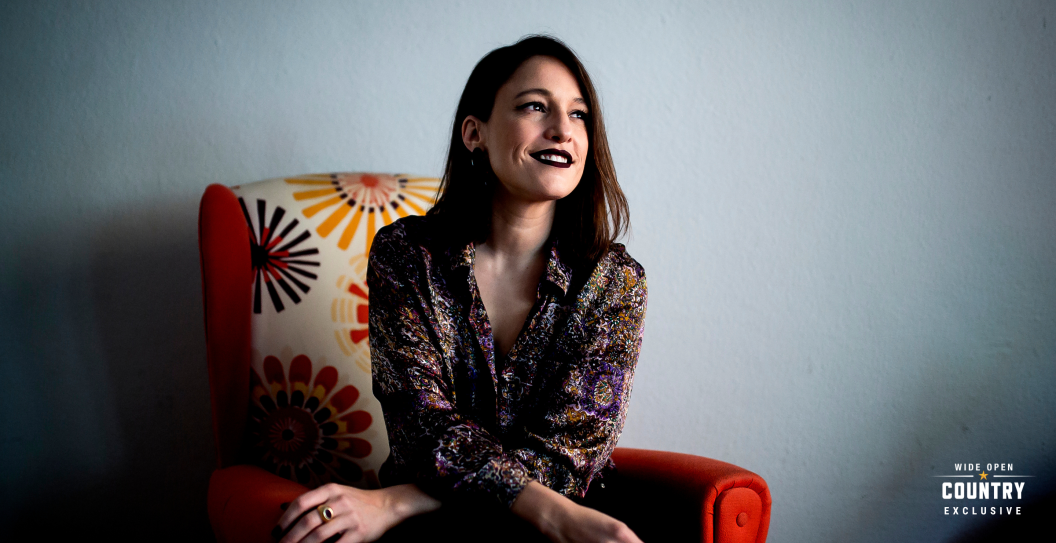In December 2023, at the New York premiere of "Poor Things," an enchanting video hit the Twittersphere: Carminho, the superstar of Portuguese fado music, serenaded the lobby of the DGA Theater. Emma Stone looked on adoringly, and the other attendees—Taylor Swift among them—were equally rapt.
Videos by Wide Open Country
It was a recreation of Carminho and Stone's magical scene from Yorgos Lanthimos' surreal feminist fantasy "Poor Things," in which Stone's woman-child character Bella Baxter encounters Carminho's melancholic song "O Quarto" on the candy-colored streets of Lisbon. When she sees a lone fadista singing and strumming the guitar, something clicks inside Bella. As Carminho puts it: "It's the first time she realizes there's pain in the world. She grows, she becomes more of a woman."
"Poor Things" has since been nominated for 11 Oscars, including Best Picture, Director, Actress (Stone), Supporting Actor (Mark Ruffalo) and Score. Carminho is immensely proud to "bring a bit of the Portuguese language and fado culture to the film," but she calls the success of "Poor Things" the cherry on top of a magnificent year. Her sixth studio album, "Portuguesa," was nominated for a 2023 Latin Grammy; in August, she performed for Pope Francis in her home city of Lisbon.
Wide Open Country sat down with the 39-year-old singer-songwriter to discuss all that led up to that magical moment at the DGA Theater, from director Yorgos Lanthimos' challenging pitch to filming the pivotal scene with Emma Stone in one take. Plus, Carminho takes us into fado's origins as a music of the underclass and how those roots reflect the world of "Poor Things." Then, she reveals her hopes for sharing the musical tradition with American audiences on a U.S. tour this fall.
Signing On to 'Poor Things'
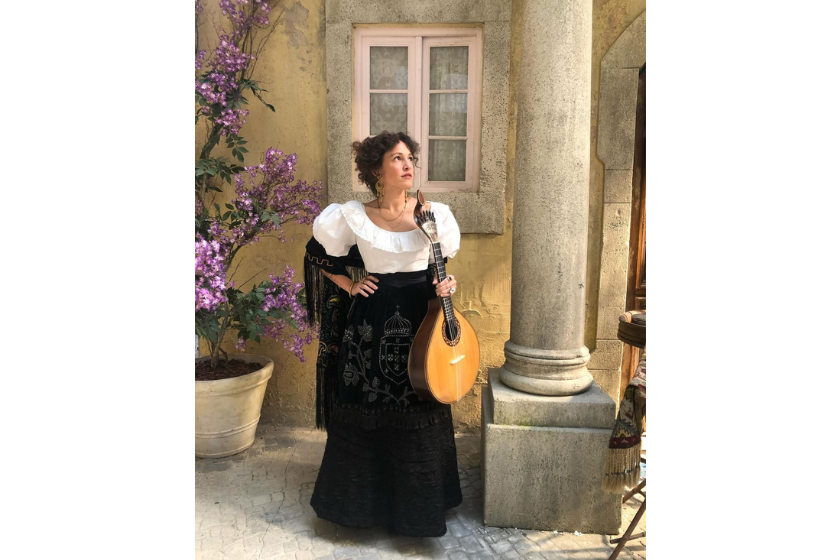
Carminho in "Poor Things." (Carminho via Instagram)
It took Carminho a week to say yes to Yorgos Lanthimos on account of the Portuguese guitar. There are very few female Portuguese guitarists, but Lanthimos had a strict no-men policy when it came to Bella's emotional breakthrough. The fadista she encountered was not to have a man strumming beside her — only Carminho had never played guitar before.
"It was important for him to center the scene between two women. I don't know if he already had the scene in his head, or if it was intuition," Carminho recalls. "So I went and practiced [guitar] a bit... no, a lot. And I said yes."
She hadn't read the script when she signed on, and she certainly didn't know anything about the wonderfully perverse character of Bella. But her own role as a fadista in traditional dress—a kind of folk hero of feminism and urban expression—made the scene instantly legible.
"I just knew it was a discovery for Bella. It was her first contact with a new world and she was completely overwhelmed and amazed by everything. She looks, and she tastes. Then she confronts herself with a song and the performance of a fadista, a professional of feelings. It was more or less like I was a professional of feelings."
In fado (which translates roughly to "fate"), singers are traditionally female. The mournful, beautifully melancholic musical style was popularized in the 1830s by Maria Severa, known as the first fadista. Part gypsy and thought of as a prostitute, Severa performed in Lisbon taverns and gained legendary status after her death of tuberculosis at age 26.
"She's a prostitute and she plays the guitar and she wears these dresses," Carminho says of the late-Romantic interpretation of Severa's myth. If you've seen "Poor Things," you'd recognize Severa's image in Carminho's costume — and the complex gender politics of sex work in Bella's character arc.
Filming Her 'Intense' Scene with Emma Stone
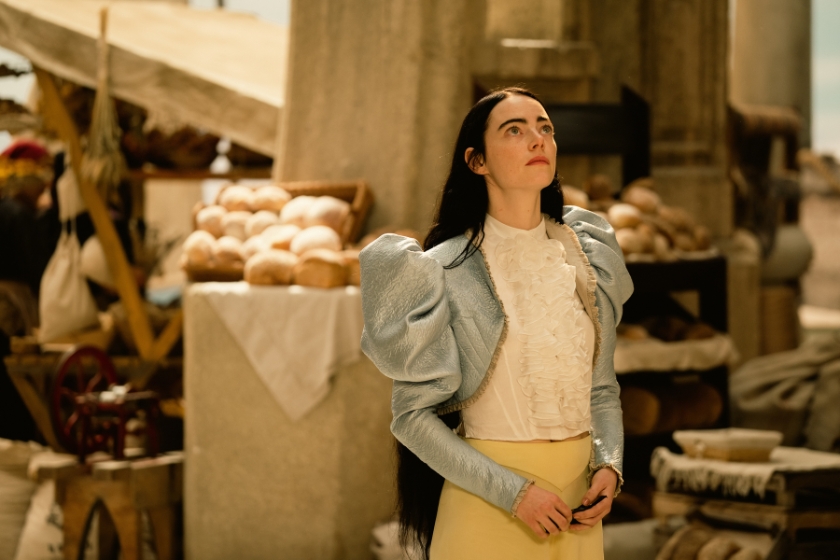
Emma Stone as Bella Baxter in "Poor Things." (Searchlight Pictures)
"Poor Things" is a surreal vision of the early 19th-century. Given Bella Baxter's radical sense of freedom in a deeply unequal society, you can see why fado, regarded as the Portuguese version of the American blues, resonates with the film's themes.
Fado sprang from Portuguese ports outside the city — the realm of the undesirables. "They used to get together and sing about their frustrations and their loves. The daily life of a woman or a prostitute or a sailor. A lot of people from the bottom of society," Carminho explains.
"It became an art expression. I think it protects you... when you want to share but you don't want to expose too much, you sing. It's a way to give to others by exorcizing your feelings. It's a traditional music with sung poetry. And we play in fado houses. They're like little clubs with no microphones. Just candles and wine. It's a very intimate place to go."
Miraculously, that intimacy would carry through to Carminho's scene with Emma Stone. Even amidst the massive, painterly backdrops of a bustling, Steampunk Lisbon, the set somehow felt close and "intense." Carminho appears on a balcony performing "O Quarto," and Bella listens with tears in her eyes. They rehearsed the scene two or three times, then shot it in a single take. What you see and hear on film is Carminho's live performance.
"I was completely overwhelmed," Carminho recalls of that day. "I had never seen anything like it. It's so complex how deep they went in the description of the place and the texture of the objects. There were little streets and squares of the city. All the city is moving with horses and people and children. And then there's just one camera in Bella's face. It's so intense."
The Meaning Behind 'O Quarto'
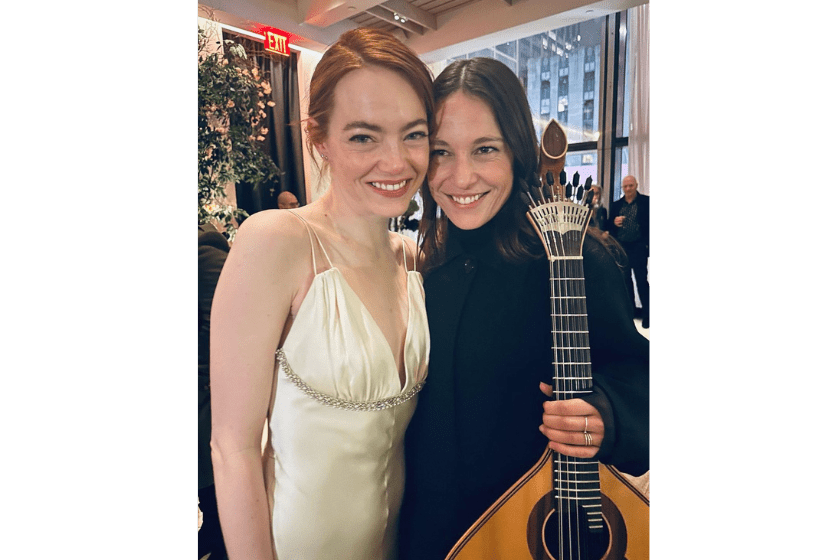
Emma Stone and Carminho at the New York premiere of "Poor Things." (Carminho via Instagram)
Carminho wrote the lyrics for "O Quarto," which translates to "The Room." It's about the paradox of loneliness: When you feel utterly alone, even the smallest room is filled with emptiness. As she puts it, "It's so empty, there's no space for even the air. It's a suffocating and suffering place."
As is tradition in fado, the music for "O Quarto" is a very old song in the public domain. Carminho chose it with intention:
"It's more or less like the first fado ever. It connected with the more primary and umbilical place of fado." Putting new lyrics to an old song reflected the surrealist, out-of-time elements of the film. "You don't know when you are."
Watch Carminho and Emma Stone recreate their scene at the New York premiere of "Poor Things" below:
Emma Stone listening to Carminho at the Poor Things' after-party pic.twitter.com/LIuHVUhkRc
— best of emma stone (@badpostestone) December 7, 2023
You can find the film version of "O Quarto" on the "Poor Things" soundtrack, which includes composer Jerskin Fendrix' Oscar-nominated score. Carminho also released a full-length version of the song on her 2023 album "Portuguesa," which scored a Latin Grammy nod for Best Portuguese Language Roots Album.
The nomination was one of a string of honors for Carminho this past year. She calls performing for Pope Francis at Lisbon's World Youth Day a life-changing moment. "I'm Catholic, and I'm a believer. I wasn't there as a performer, but as a pilgrim. And to give to the world something that God gave me."
Her Upcoming U.S. Tour
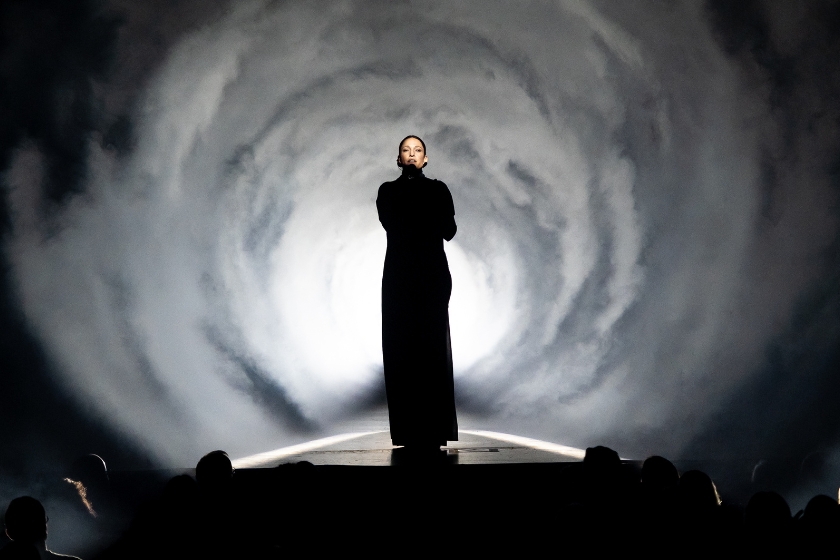
Carminho performing in Lisbon in Nov. 2023. (Pedro Gomes/Redferns)
Yes, she has reverence for fado's history and heritage. Her mother, Teresa Siqueira, was a fadista. "In my mother's belly, I was listening to fado," she notes. She's also deeply experimental in her sound, but even that's baked into the DNA of fado. "It's not an exercise in memory or old things. We put new lyrics to old songs. It's like the blues. It's soul speech. It's a very alive language."
There's often a sonic surprise in Carminho's music. She incorporates lap steel guitar on her new album, giving it a tinge of honkey-tonk sound that calls to mind Don Helms' work on Patsy Cline's "Walkin' After Midnight." And she records completely live so that fado's rhythmic oddities and stretches of broken sound give an almost sickly sensation:
"It's to transport listeners to a feeling of vertigo. You don't know where you're going to fall, if you're going to fall. You're afraid to ruin the silence, but we're playing together. It's like a tension movement."
With an uncommonly fruitful 2023 behind her, Carminho looks forward to introducing American audiences to the unique beauty of fado in a U.S. tour this fall, which she'll announce imminently on her website and Instagram.
"Poor Things" opened wide in theaters in December. It is expected to stream on Hulu in early-to-mid-2024.
